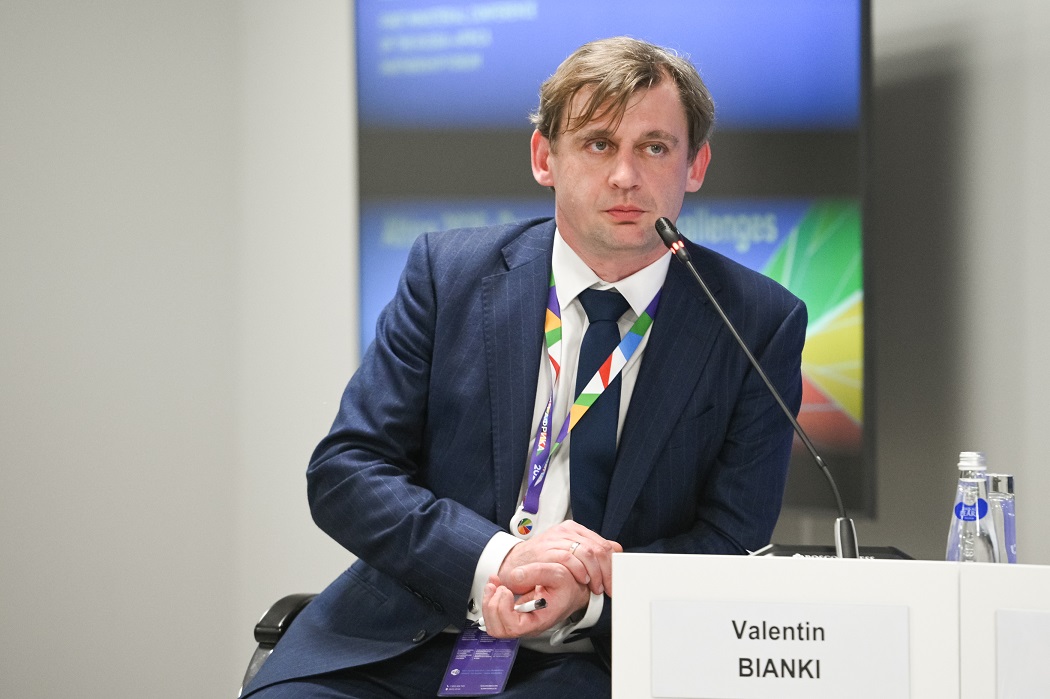HSE Presents an Analytical Handbook on Africa for African Leaders
.png)
The HSE University Centre for African Studies has presented an English-language expert-analytical handbook titled ‘Africa 2025: Prospects and Challenges.’ For the first time, Russian experts have prepared a comprehensive work aimed at an African audience rather than Russian readers. The handbook incorporates a significant amount of new data and introduces new approaches for assessing development prospects. The presentation took place in Sochi on November 9, 2024, during the First Ministerial Conference of the Russia–Africa Partnership Forum.
The English-language publication was prepared by a team of experts from the HSE Centre for African Studies, under the general editorship of the centre's director, Andrey Maslov. The book is primarily aimed at an African audience, including government officials, business and civil society representatives, scholars, and experts.

The presentation was moderated by Valentin Bianki, Leading Expert at the HSE Centre for African Studies.
The main objective of the publication is to offer readers the perspective of Russian experts on the key challenges faced by African countries and the opportunities arising from the growth of their economies. The book also provides an alternative view of the long-held perceptions and stereotypes about Africa.

‘We want this book to be used throughout Africa by key organisations and government bodies, and to be on the desks of those making important decisions. We plan to make this an annual publication and intend to translate ‘Africa 2025: Prospects and Challenges’ into French and possibly into Russian. I see this as a significant step towards establishing and shaping a channel for the exchange of information between Russia and Africa,’ noted Valentin Bianki.
The centre also plans to hold a series of discussions on the text with African experts in various African countries at the venues of leading international and expert-analytical organisations.
Deputy Director of the HSE Centre for African Studies, Vsevolod Sviridov, provided a detailed overview of the book’s structure and the work of its authors.
‘The main sections of the book cover topics that are relevant to any organisation operating in Africa. We discuss the transport system, macroeconomics, food sovereignty, energy, education, and more. During preparatory research, numerous studies were conducted, gaps in data were identified, and topics that had remained in the shadows of the global agenda were highlighted,’ he emphasised.

The text explores themes such as the macroeconomic status of African countries, their internal and external debt, the cost of borrowing, and the degree of trade diversification; key trends in agriculture and consumer habits; the connection between food sovereignty and population growth; the role of fertilisers and food reserve systems in addressing food crises; the state of electricity generation in African countries; the role of gas-powered generation; and opportunities presented to African nations by energy transition. It also covers major trends in education, the development of the creative economy, and the growing role of African business in the continent’s economy.
A recurring theme in the publication is ensuring the sovereignty of African countries in financial, food, energy, digital, cultural, and educational aspects.
‘We discuss deficits, imbalances, and opportunities and how to overcome these challenges. One of the key chapters focuses on food sovereignty. Here, we show that Africa can feed itself in basic categories, as it has the necessary land and capacities. The problem rather lies in how its industries are structured. Our research indicates that population growth does not lead to declining food situations, but rather improves them. We explore methods of enhancing the efficiency of food systems and analyse successful practices from African countries,’ Sviridov highlighted.

Moctar Seck, Chief-of-Section of the Technology, Innovation, Connectivity and Infrastructure Division at the United Nations Economic Commission for Africa, praised the team for their excellent work. ‘This publication shows us the issues that are crucial for Africa when you talk about food security, energy, digital sovereignty, independence, business, and commerce. These topics are extremely important for the continent’s development. This work offers a deep analysis of these subjects,’ he noted.

Tatenda Mavetera, Minister of Information Communication Technology, Postal, and Courier Services of the Republic of Zimbabwe, also highlighted the importance of ‘Africa 2025: Prospects and Challenges’ and encouraged the audience to move beyond stereotypes. ‘Let’s be creative like the people of Africa,’ she advised.
Hassan Khannenje, Director of the HORN International Institute for Strategic Studies, emphasised the significance of the work on food security.

‘This is a very timely study, especially on food sovereignty, which is an extremely important issue. This chapter is significant because it discusses geopolitics, where, as we understand, there have been failures and shortcomings in food supply and understanding. How are you feeding the nation and where is that food coming from? Do you control food resources? Is there enough? Our countries are indeed very vulnerable in this regard. It is more than just food security; it is more than economic development; it is food sovereignty. We must manage water resources properly and avoid exploiting them because sustainable development of the food sector depends on it. We must ensure that people never suffer from shortages again,’ he urged.

HSE Vice Rector
‘The book marks an important milestone in the development of the HSE University’s Centre for African Studies—the centre’s entry into the African expertise market. ‘Africa 2025: Prospects and Challenges’ and the positive response from African officials and experts demonstrate that the centre’s work, its ideas, and proposals are already in demand in Africa and are competitive at the global level.’
See also:
HSE Experts Help to Implement Science and Technology Foresight in Africa
The population of African countries is growing so fast that the continent is likely to play a significant role in global development. However, the socio-economic situation in African States remains dramatic. Access to high-quality education, the development of science and high technologies are crucial in addressing these challenges. Professor Alexander Sokolov, Head of the UNESCO Chair on Future Studies at HSE University, spoke at the International Forum of UNESCO Chairs and Partners ‘Transforming Knowledge for Africa’s Future.’ The event took place in Addis Ababa, Ethiopia.
Keeping Dialogue Open with Africa: Rectors of Regional Universities Visit HSE
At the end of April 2024, HSE University hosted an international conference ‘Export of Russian Education to Africa: Challenges and Opportunities.’ The event was attended by leaders of universities from Mali, Burkina Faso, Burundi, Niger, and Guinea. Together with their Russian counterparts from government bodies, scientific and higher educational institutions, they outlined paths for the development of humanitarian relations and agreed on possible cooperation in the face of a changing world order.
HSE Hosts Round Table ‘Africa and BRICS: Reflections and Prospects’
On April 15, 2024 HSE University hosted a roundtable discussion ‘Africa and BRICS: Reflections and Prospects.’ The event featured leading experts from the South African Institute of International Affairs (SAIIA) Steven Gruzd and Gustavo de Carvalho and was moderated by HSE Vice Rector and Head of the BRICS Expert Council–Russia Victoria Panova.
‘We Have Promising Opportunities with Africa, and It Is Important to Foster Cooperation’
A Strategic Session focusing on cooperation between Russia and African countries in the sphere of higher education was held at HSE University's building on Pokrovsky Bulvar. The event was attended by representatives of HSE University, rectors of other Russian universities, and ambassadors and ministers of higher education from several African states.
Russia and Africa: Sharing Knowledge in Digitalisation
A school focusing on the digitalisation of public administration for civil servants from African countries was held in Moscow in December 2023. The school proved the high demand for Russian training programmes — representatives of 23 countries and 3 international organisations received certificates following advanced training.
Russian Government and HSE University to Help with Digitalisation of African Countries
The Russian-African Competence Transfer Programme in the Field of Public Administration Digitalisation in African Countries, which is being implemented by HSE University's Centre for African Studies, will be partially state-financed. The subsidy will be provided by the Russian government in accordance with the corresponding order signed on September 21.
Russia to Help Africa with Public Service Digitalisation
Russian and African civil servants are to exchange experience in the field of digitalisation. The programme was presented by HSE University’s Centre for African Studies in cooperation with the Innopraktika company. The programme organisers are also ready to carry out educational events in any country on the continent.
Association of African Graduates of Russian Universities to Be Created in St Petersburg
The first international Forum of African Graduates of Russian and Soviet Universities has come to an end. The forum was held at HSE University in St Petersburg as part of the second Russia–Africa Summit.
HSE Researchers Undertake Unique Scientific Expedition to West Africa
Researchers from the HSE Faculty of Social Sciences will study social processes in African countries, the issues and features of the continent’s demographic development, and problems related to the causes of separatism and decentralisation in particular African states during a multi-day scientific expedition that will be launched in June 2023.
Dialogue with Africa: How Nigeria and Russia Can Promote Mutually Beneficial Cooperation
Russia and Nigeria have good prospects for cooperation in many economic sectors—from mining, petrochemicals, agriculture, and high-tech manufacturing to education and mutual investment. The Embassy of Nigeria in Russia, together with NUIA Consulting and HSE University, has held a business briefing on ‘Entering New Markets: Nigeria—Opportunities, Prospects and Practical Experience of Russian Companies’.


